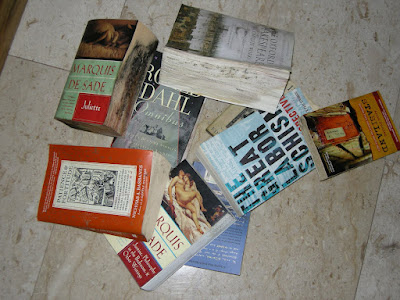1. "The Singapore Grip", by J.G. Farrell, 1978. Available in a NYRP edition these days.
What is this Singapore grip thing exactly? It becomes a bit of a running gag in the novel and you don't find out until near the end, but it's worth the wait.

Here is a Great Book of the new old-school, teeming with immense human insight and dark humour. And bloody interesting (certainly to me) information about Singapore in the year leading up to the fall of Singapore to the Japanese. Robber rubber barons and communist mata-haris mix it in the tropical humidity. Yet for all its proselytising and the wealth of opinions espoused by the various characters, the style is easy and relaxed, with a classical feel, perhaps because of the clarity of Farrell's descriptive powers. It's one of the few Oriental books where the literally exotic (ex- out of, otic - the east) scenery doesn't seem to get in the way of the essential plot(s). It's something like reading Joseph Conrad at his best, but much more funny and obviously with a slightly more modern tale. If only more books were as 'gripping' (ho ho) as this.
So, you're of the It's Not Set In New York So Fuck It school of literary appreciation, and you don't give a fuck about the street number accurate depiction of pre-war Singapore and its snobby, foolish British elite, or the bungling pig-headedness of the unprepared British and Australian military, or the exact methods of exploiting the Malayan rubber workers? That's OK.
Read it instead for it's universal theme of sexual intrigue. There is the incredibly amusing story of the (perhaps overly) naive, idealistic Matthew Webb who is fresh in town from the collapse of the League of Nations, as he fends off the romantic advances of the pretty white girl, Jean Blackett, the daughter of his deceased father's partner (who wants to lock together the firm of Webb and Blackett for one more generation and for more profit.) Meanwhile Matthew's once best-friend is trying in vain to interest Jean in himself by bowing to her every outrageous whim, which of course only makes her respect him less. Then there is Matthew again, instead learning the Chinese way of Yin-Yang sex. Upstairs, cramped in a dark, smoky, tiny tenement in Chinatown with the half Chinese, half White Russian (maybe) femme fatale (feel my breast) Vera, he puts on his glasses and brings the lamp closer to get a better look at her "pearl in a jade sea"... This is one of the unable-to-stop-smiling-and-chuckling jokes with which this book is teeming!
Read it also for the war-drama of the inexorable approach of the Japanese army down the Malay peninsula, for the terror of the soldiers, both Japanese and Allies in the fog of night-time battle, and for the desperate heroism amongst the tragedy of the fire-fighters battling raging infernoes as bombs fall on the Singapore docks - you can't help but think of the 9/11 fire-fighters at this point.
One of the key themes of the book is how nothing ever really changes in itself, no matter how much it is altered on the outside. Certainly this books raises most of the issues I continually rage about concerning Singapore; exploitation (of maids), nepotism, etc... except maybe for taxi-drivers.
To highlight this, Farrell tells the fable of some King or other (can't find it now, forgot to bookmark it) returning from the Battle of Arles [sic?] approached by a fisherman (or something) who asks, "Did we win?" "What does it matter to you if we won?" replies the King. "You'll still be a fisherman."
Mmm. Singapore is still Singapore.
The book ends as the Japanese march the surrendered westerners to the Changi internment camp. This is where many Singapore war books start.
I loved it, maybe because I haven't read a book with such high drama mixed with such dry irony and wonderful humour for a while. It's one of those big tomes (598 pages) that you can't stop reading once you gather up the gumption to start yet you don't want ever it to end (yada yada). Big though it is, the style is tight, plot motivates all the action and it's not overloaded with crap unrealistic dialogue or bullshit diversion like many "novels" these days seriously in need of an editor.*
Note: Ayn Rand would not like this book. Which can only be a plus to my (and Matthew's) way of thinking.
~~~~~~~~~~~~
J.G Farrell won the Booker Prize in 1973 for his previous book, 'The Siege of Krishanpour', and in his speech of acceptance condemned Booker-Connell for the working conditions in their plantations in the West Indies. Those were the days, when it was not an attack on the very fabric of the universe to stand up for those who lack the opportunity and means to speak for themselves. This sense of aggrievement for the oppressed and foreign is one of the many things I like (being an armchair socialist myself) about The Siege and The Grip (I've read Troubles too, and the naive newcomer character is there, as is the actual Major, but it is not as politically engaged as the others.)
Farrell was swept out to sea while rock fishing in Bantry Bay, Ireland not long after publishing this book. He was only 41. What a great pity. I would have loved to read whatever he was to write next, and you should read what he has already written.
~~~~~~~~~~~~~
2. "The Boat" by Walter Gibson, originally published in 1963, I think. 2007, from
Monsoon Books in Singapore. (Review copy. Thanks Phil!)
Another interesting Singapore war-time story in a completely different vein, this is a true first person account of how 135 survivors from a boat that was sunk escaping Japanese occupied Malaya (or Borneo? it doesn't matter - I don't have the book with me to check some details) try to survive while clinging to a lifeboat built for 28 adrift in the Malacca Straits for nearly a month without enough water or food, apart from sashimi. Terrible things ensue. Four people survived this amazing ordeal, including the only female, a nurse who was immediately captured by the Japanese as she trudged away looking for food and water and sent to a prison camp. Gibson himself had only just escaped from one of those death marches which are all too popular these days (books about them I mean) before he found himself in this new predicament. The writing is, um, not at Farrell's level, more documentary style, but it is the steeliness of these people's will to survive the horrors of their "ultimate escape" journey that keeps you reading with gruesome fascination. Despite it being a stark, ultimately sad tale, I felt warmed by the strength of its depiction of such stoic, human perseverance. How would I manage under such circumstances? Really enjoyed reading it, as it gave me a lot to think about.
And it is only 100 pages.
~~~~~~~~~~~~
[Addendum: a late inclusion...]
3. The City & The City, China Miéville, 2010. Pan.
A murder mystery, corruption thing set in the weirdest cities you've ever heard of... Besźel and Ul Qoma are cities with different cultures, different architecture, different languages, different rules... but they inhabit the same geographic space. The towns mesh and weave through each other in the strangest most disorienting ways; buildings on the same street, even on the same side can be in the different city. If you cross a path in the wrong place or stoop to chase your wind-tossed hat you might've crossed the border - illegally. You've Breached. You're gone, as in disappeared. Even to look at the other city or its inhabitants is Breach. There is a border point where, after copious paperwork and baksheesh, you can get to the other city, but while you physically walk the same streets, you no longer are allowed to see the city you just left. You have to "unsee" it, just as you "unsee" that city from the vantage of the other.
Traffic, understandably, is a nightmare as you must avoid the cars, buses, trucks and pedestrians you are not allowed to see. To "unsee" other cars is to automatically filter them from your consciousness while physically getting out of their way as well.
In this sense, it reminds me of the traffic in Vietnam and in India.
Another top read. Will no doubt win some award for something.
E@L
* I started some Laurel K Hamilton vampire-hunter novel once (why oh why?) and gave it up when I noticed it had taken over 5 pages for her characters to move from the car to the house as they discuss some hokum irrelevant bullshit and go through five stages of a relationship. Is she paid per word? Padding!

















